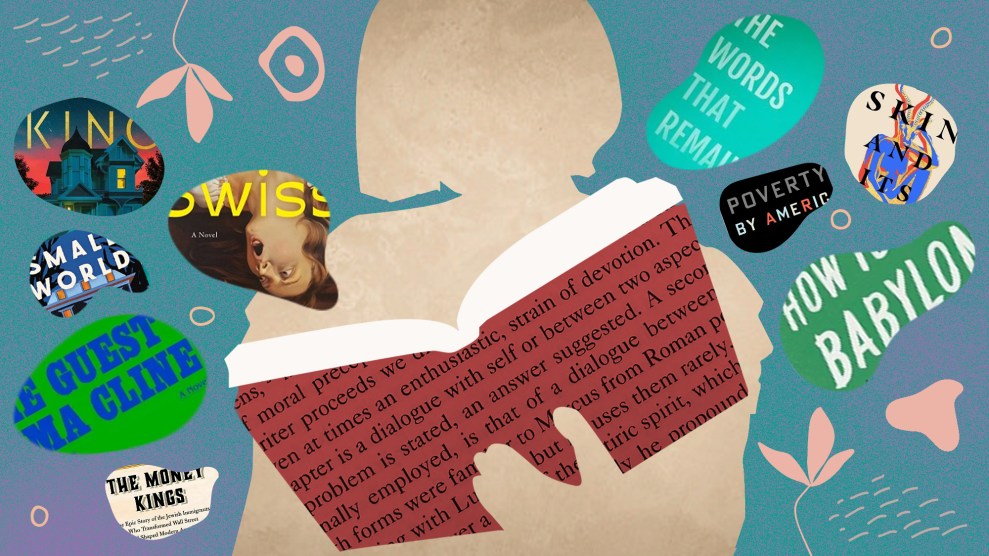Visions
Four decades ago Kenneth and Mamie Clark demonstrated that black children preferred white dolls to black ones, documenting the impact of segregation. Their work was pivotal in the 1954 Brown vs. Board of Education decision. Gerald Markowitz and David Rosner’s Children, Race, and Power: Kenneth and Mamie Clark’s Northside Center (Charlottesville, Va.: The University Press of Virginia, 1996) tells the Clarks’ story from their early work in the ’50s onward as they battled poverty and racism in Harlem.
Race and culture are not the same, states David Hollinger in Post Ethnic America (New York: Basic Books, 1995). Sounds obvious, but flawed affirmative action policies too often blur these lines, oversimplifying the debate, says Hollinger. In his book, the UC Berkeley historian calls for a more cosmopolitan approach to affirmative action, allowing for individual choice in ethnic identity — a luxury currently enjoyed only by whites.
Linda Gordon’s Pitied but Not Entitled: Single Mothers and the History of Welfare 1890-1935 (Cambridge, Mass.: Harvard University Press, 1994) shatters the logic of those who call for an end to welfare. Gordon shows clearly how attitudes about class and gender led to social assistance programs that were never as redistributive as necessary. She argues for a broader and more honest social agenda that can provide for all citizens.
More Thomas Moore
In a period very much like our own, marked by deep national divisions and collective soul-searching, Walt Whitman celebrated the self and nature in his poetry, creating an artistic vision that was moral, mystical, and uniquely American. David S. Reynolds’ Walt Whitman’s America: A Cultural Biography (New York: Vintage Books, 1996) examines our greatest poet’s attempts to ease the rifts caused by slavery, secession, and civil war.
Modern medicine has a tendency to ignore the most important parts of a person’s life in its quest to quantify, diagnose, and treat. For Dr. Rachel Naomi Remen, the kitchen table is a place to tell these life stories. In Kitchen Table Wisdom: Stories That Heal (New York: Riverhead Books, 1996), she relates remarkable vignettes from her work as a psycho-oncologist: helping a teenager with leukemia talk about death for the first time, guiding a man with melanoma to use his own imagery to heal. Medical director of the cancer retreat center Commonweal, Remen searches for soul amid grim diagnoses. As one of her patients puts it, “When you’re walking on thin ice, you might as well dance.”
Nubar Alexanian’s photographs in Where Music Comes From (Stockport, England: Dewi Lewis, 1996) are fast and furious, like the performers and fans pictured. Wynton Marsalis lords over his trumpet at the New Orleans Jazz Festival; the Mississippi Mass Choir rehearses on its tour bus; Joseph Shabalala of Ladysmith Black Mambazo holds red roses and two apples on opening night on Broadway. The book celebrates the dedication that goes into creating great music.
It’s Not Easy Being Green
With debates raging over the ozone layer and spotted owls, environmental science has transformed itself from an academic discipline into a political lightning rod. Population experts Paul R. and Anne H. Ehrlich study the field’s evolution in Betrayal of Science and Reason (Washington, D.C.: Shearwater Books/Island Press, 1996). The husband-and-wife team details the rise of “brownlash” environmental writers — who’d have you believe the current global crisis is overstated, if not a downright lie — and takes aim at their theories.
While people around the globe worry about hotel reservations for New Year’s Eve 1999, the folks at the Millennium Institute are focusing on maintaining human development beyond the 21st century. The institute’s Web site features sustainability models and “State of the World Indicators” — a frightening list of environmental statistics like the number of species going extinct daily (104) and the number of years until 80 percent of the world’s oil reserves are gone (24).
Do your part for the planet: Grow salicornia. Salicornia virginica, also known as pickleweed or sea bean, is a crunchy, salty treat. Pacific Estuarine Research Lab’s John Callaway recommends it with salad. Able to grow in salty water and essential for wetlands restoration projects, salicornia seeds or clippings are available from North Coast Native Nursery in Petaluma, Calif. To order, call: (707) 769-1213
In The Case Against the Global Economy (San Francisco: Sierra Club Books, 1996), editors Jerry Mander and Edward Goldsmith marshal more than 30 contributors to explain why the global economy — through corporate takeovers in the developing world and skewed economic indicators like the gross national product — is ruining the planet’s future. Ralph Nader discusses the negative consequences of GATT and NAFTA; William Greider analyzes the power of General Electric; and all offer solutions.
Capitol Offenses
Spin doctors can make statistics say anything, but communications professors Michael W. Traugott and Paul J. Lavrakas’ accessible handbook will help savvy voters avoid getting spun. The Voter’s Guide to Election Polls (Chatham, N.J.: Chatham House, 1996) explains sampling methods, error margins, and “push” polls, with a list of questions to ask before taking a poll’s numbers at face value.
In one of Mike Luckovich’s syndicated cartoons, the Republican revolution boat is sinking and desperate politicos turn to Newt: “I thought you brought the oars.” GOP foot soldiers may not think it funny, but for Luckovich fans, there’s plenty to laugh at in the first book of the cartoonist’s work. Lotsa Luckovich (New York: Pocket Books, 1996) takes a hilarious look at Newt, O.J., Lisa Marie and Michael, and the tobacco wars.
In January 1995, the visage of Newt Gingrich was nearly inescapable, as he hogged airtime to proclaim his ascension into the ranks of history’s greats. In Tell Newt to Shut Up! (New York: Touchstone, 1996), a whirlwind, behind-the-scenes account of the Republicans’ tailspin, David Maraniss and Michael Weisskopf relate the decline that left Newt, a year later, sobbing at the wreckage of the GOP agenda.
New & Not Worthy
(from the roll-your-eyes files)
Just what the country needs in this election-cum-book-tour year: yet another political memoir of an average Joe who made it to the top. Hard-to-swallow fact #23 from Power, Pasta, and Politics: The World According to Senator Al D’Amato (New York: Hyperion, 1996): “I worked honestly for every penny I ever earned.” We noticed the book was heavy on one ingredient — cheese.
Pick your poison: If you just can’t quit smoking, Dr. Brad Rodu suggests taking up chew or spit tobacco. In For Smokers Only: How Smokeless Tobacco Can Save Your Life (New York: Sulzburger & Graham, 1995), he argues that “it is the smoke from the cigarette, not the nicotine, that causes disease.” Tell that to the 8,000 people who will die of oral cancer this year.













